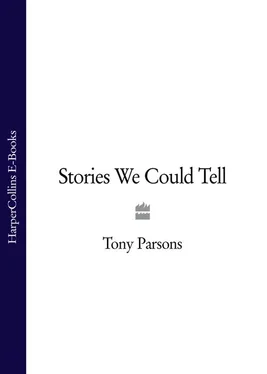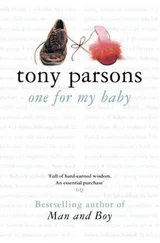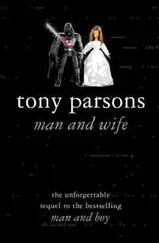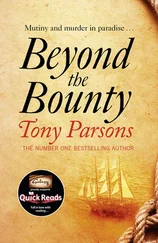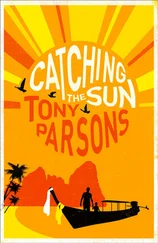‘A journalist?’ said the man, a note of suspicion in his voice, as if a real journalist should be wearing a suit and tie, or carrying a briefcase, or old or something. ‘What you write about then?’
Terry smiled at him.
It was the end of a summer day in 1977 and there was something in the air, and in the clubs, and pouring out of every radio. Everything was suddenly good again, the way it had been good ten years ago, back in the Sixties, when Terry was a child, and his parents still thought that the Beatles seemed like nice boys.
What did he write about? He wrote about the way everything was changing. From haircuts to trousers, and all stops in between. What did he write about? Oh, that was a good one.
Terry thought of something that Ray Davies had said recently, about how he felt like sobbing his heart out whenever he looked at anyone’s record collection, because it was just so moving to see that personal soundtrack laid out before you, naked and open and fading with the years, because if you cared about this kind of thing then it was all there among the scratched vinyl and the cracked gatefold sleeves, as plain as could be, all the hopes and yearnings of someone’s private universe, and everything that a young heart could possibly want or need or yearn for.
‘I write about music,’ Terry said.
Misty was waiting for him at the arrivals gate.
He saw her before she saw him. He liked it that way. It was one of his favourite things in the world – to see her before she saw him.
Misty. His honey-haired, cat-faced darling. Tall and slim in a simple white dress matched with a pair of clonking great biker boots.
Girls were starting to do that all the time, pairing something undeniably feminine – mini-skirts, fishnet tights, high heels, Misty’s simple white dress – with something brutally male – DMs, spiked dog collars and wrist bands, Misty’s motorcycle boots. Throwing their sex in your face, Terry thought, demanding to know what you were looking at, and silently asking you what you were going to do about it. It was a new thing.
Slung over her shoulder was a bag with her camera equipment. Dangling from one of the straps, where you might expect to find a little plastic gonk or perhaps a figurine of the Fonz or Han Solo, there was a pair of handcuffs – pink fake mink handcuffs. You couldn’t tell at first glance if they came from a toyshop or a sex shop.
Misty and her pink fake mink handcuffs. Terry sighed at the sight of her.
She was like a girl from a book. No, a woman – you couldn’t say girl any more, that was another of the new things, it wasn’t allowed to say girl, you had to say woman, even when they were still – technically, legally – girls. Misty had explained it all to Terry – it was something to do with what she called the suffocating tyranny of men .
Funny that, thought Terry.
Yes, she was like the bird – woman – in the Thomas Hardy novel they read at school, the year he dropped out and went to work in the factory. Far from the Madding Crowd . Misty was like the woman in there – all female softness, but with a thread of steel you couldn’t guess at by looking at her. Bathsheba Everdene. That was Misty. Bathsheba Everdene in a white dress and biker boots, Bathsheba Everdene with a pair of pink fake mink handcuffs.
She still hadn’t seen him, and the sight of her face scanning the crowd full of strangers made his soul ache. Then she caught his gaze and started jumping up and down, so glad to see him again after being apart for so long.
Over a week!
She ducked under a sign that said STRICTLY NO ENTRY and ran to him. She wasn’t the kind who cared about signs, she moved through the world as if she had a right to be there – anywhere, everywhere. Like a woman in a book, like a girl in a song.
‘Look, Tel,’ she said.
She had the most recent copy of The Paper in her hands. Almost a week old, and somehow the ink was still damp, and her fingertips were black, and there on the cover was a gaunt, grim-faced man with platinum blond hair standing in a trench coat by a great wall with a sign that said, Achtung! Sie verlassen jetzt West Berlin .
Terry’s story on Dag Wood, written on a hotel laundry bag and phoned in from Berlin.
‘So what’s he like?’ Misty said, and he had to laugh, because normally the question drove him nuts.
You wrote a 3,000-word piece about someone and then everybody asked you, What’s he like then? What he was like was in the story, it was always in the story, or the story had failed. When Tom Wolfe wrote about Muhammad Ali, or Phil Spector, or Hugh Hefner, did people say, Yeah, Tom, but what are they really like? Probably. But Terry didn’t mind. As it was her. As it was Misty.
‘He’s the greatest,’ Terry said. ‘I’ll introduce you tonight, okay?’
Then Misty had that look in her eye, that sleepy, faraway look, and she was tilting her head to one side, so Terry placed his mouth on her mouth, and felt her fingers running through his dyed black hair, and the cameras that were stuffed inside her shoulder bag pressed through his Oxfam jacket and against his heart.
Their kisses tasted of Marlboro and Juicy Fruit, and as they snogged at the arrivals gate, completely wrapped up in each other, oblivious to the smirks and stares and snide comments – ‘What are that pair supposed to be dressed as, Dad?’ – neither of them doubted that their kisses would taste that way for ever.
Leon Peck was doing the singles.
He sat in the review room, the little corridor-shaped cubbyhole with a stereo where they went to listen to new music, and all around him were the week’s releases, maybe a hundred or more seven-inch 45s, some of them in the new-fangled coloured vinyl and picture sleeves.
Convention demanded that Leon found something to rave about – The Single of the Week – and then picked twenty or thirty other singles that were worthy of a cheap joke that could be told in one pithy, piss-taking paragraph.
A kind of spiteful irreverence had always been a part of The Paper’s appeal, and just under the title of every issue the readers were promised, ‘Hotsies, groovies, goldies and a rootin’, tootin’ tab of vicious controversy’. That was exactly what Leon needed to conjure up for his singles page. A rootin’, tootin’ tab of vicious controversy.
Except he couldn’t be bothered.
Something had happened to Leon at the weekend that made slagging off – let’s see, what do we have here? – ‘Float On’ by the Floaters or ‘Easy’ by the Commodores or ‘Silver Lady’ by David ‘Starsky’ Soul – or was he ‘Hutch’? – seem beneath him.
Something had happened at the weekend that had changed the way Leon looked at the world. So he picked up ‘Silver Lady’ -Starsky or Hutch grinning like a lobotomised Osmond on the picture sleeve – and flung it across the room like a Frisbee. The seven-inch slice of vinyl shattered with a satisfying, surprisingly loud crack against the far wall. It felt good.
So good in fact that Leon did the same with ‘Float On’. And then ‘Easy’. And then ‘You Got What It Takes’ by Showaddywaddy. Leon picked up ‘Fanfare for the Common Man’, the new single by Emerson, Lake and Palmer, and that was tossed with particular venom. Soon the review room was covered in shards of splintered vinyl.
Leon pushed back the stacks of singles and began leafing through the most recent issue of The Paper , sighing at the soul-shrivelling trivia of it all. Didn’t these people know what was going on in the world?
There was Dag Wood on the cover, doing his tired old heroic-junkie routine by the Berlin Wall. Leon was pleased for Terry – could imagine him puffing up with pride at the sight of his story on the cover – but come on . As if Lou Reed hadn’t done it all first and better! As if Dag Wood actually knew the difference between Karl Marx and Groucho!
Читать дальше
